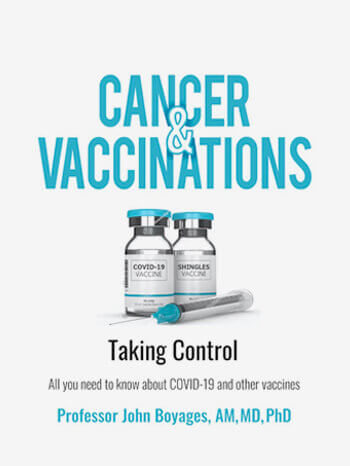Archives: Books
Display Books
Cancer & Vaccinations: Taking Control
About
All you need to know about COVID-19 and other vaccines
Australia Day 2017, when I was recognised with an Order of Australia award, was a bitter-sweet moment, as the day before, I had received my first dose of chemotherapy for Hodgkin’s lymphoma. After eight months off work, I too became a ‘cancer survivor’.
My treatment team didn’t talk to me about vaccinations, and I suspect you may be in the same situation. In 2020 my nephew, a general practitioner, called me and said I needed to be vaccinated for shingles, pneumonia, and whooping cough, especially because of my previous cancer treatment. I started doing my own research to help my patients and me.
Learn how to:
- Which vaccines to have before or after your cancer treatment
- What vaccines to avoid during your cancer treatment
- How to reduce your chances of an unwanted infection
- The common and uncommon complications after vaccination
- How to avoid lymphoedema after a vaccination
- All about the COVID-19 vaccines in the context of previous cancer
- The risk of rare blood clots or heart inflammation after COVID-19 vaccination
- How to reduce the risk of shingles, pneumonia, and whooping cough
Male Breast Cancer: Taking Control
About
All you need to know to “take control” after a diagnosis of male breast cancer.
Male breast cancer is not common and often underdiagnosed and undertreated. Using the familiar image of a garden and a personal, plain English style, renowned breast cancer specialist Professor John Boyages, MD, PhD, walks you slowly through the stress and confusion of diagnosis, treatment, and life after male breast cancer.
In Male Breast Cancer: Taking Control, John Boyages provides you with all the information you or your family and friends need to take control, maximize your survival, and find your path to recovery.
Learn how to:
- Know the difference between “man boobs” and male breast cancer
- Have the right tests for an earlier diagnosis
- Avoid under- or overtreatment
- Ask your treatment team the right questions
- Choose treatments for your breast and lymph nodes
- Deal with stress, anxiety, fatigue, and sexuality during and after treatment
- Understand when chemotherapy is really required
- Get specific up-to-date information for male breast cancer and avoid pamphlets designed for females
- Achieve a more positive state of mind through inspiring and motivating patient stories and key take-home messages
Some key features:
- “Traffic-light” colors guide you through treatment phases
- 20 color-coded “Control Points”
- Clear end of chapter “Warning”, “Tip” and “Remember” icons and summaries
- End of chapter take home messages
- 10 real-life patient stories
- Plain English style with garden and other analogies to explain your breast cancer and its treatment
- Over 50 images and graphically designed diagrams
- Over 70 hand-picked web links
- Detailed glossary, key references and index (print version)
DCIS of the Breast: Taking Control
About
All you need to know to “take control” after a diagnosis of DCIS of the breast. Using his now familiar image of a garden and a personal, plain English style, renowned breast cancer specialist Professor John Boyages, MD, PhD, walks you slowly through the stress and confusion of diagnosis, treatment and life after DCIS of the breast. Your whole life stops after a diagnosis of DCIS. The condition is extremely confusing. Treatment advice varies and there is a danger of both under-treatment and over-treatment. One doctor recommends a lumpectomy and radiation and the other a mastectomy. One tells you it’s a cancer and the other it’s not cancer. In DCIS of the Breast: Taking Control, John Boyages provides you with all the information you and your family and friends need to take control, understand what DCIS means and how to best treat this condition.
Some key features:
- Identify the 20 “Control Points” – important decisions you must make to navigate the medical maze
- Find and research the right treatment team for you
- Determine when a breast MRI may be indicated
- Identify the key questions to ask your treatment team
- Identify the treatment choices for your breast and armpit
- Understand what oncoplastic surgery means
- Avoid under- and over-treatment
- Learn when hormonal treatments may be necessary
- Cope with life after treatment
- Take control if DCIS or cancer returns
Note from the author
“In this book, I will teach you all about DCIS. This book includes all the latest diagnostic and treatment techniques after a possible diagnosis of DCIS. Treating DCIS is sometimes more difficult than treating invasive breast cancer as there are many options and issues for this condition which is one step before breast cancer. The book is broken down into three coloured parts detailing the phases of your cancer treatment.” Professor John Boyages, MD, PhD
Lymphoedema: Taking Control
About
From the author of other Taking Control Books: Breast Cancer; DCIS and Male Breast Cancer
Breast Cancer: Taking Control
About
Using the familiar image of a garden and a personal, plain English style to illustrate your cancer and how it affects your body, Professor Boyages, MD, PhD, walks you slowly through the stress and confusion after a diagnosis of breast cancer.
Some key features:
- “Traffic-light” colours guide you through treatment phases
- 20 color-coded “Control Points” with detailed flow charts
- Clear end of chapter “Warning”, “Tip” and “Remember” icons and summaries
- 15 real-life patient stories
- Plain English style with garden and other analogies to explain your breast cancer and its treatment
- 125 photographs in full color
- 28 graphically designed diagrams
- 75 hand-picked web links
- Detailed glossary, key references and index
Learn how to:
- Identify the 20 “Control Points”: the 20 important decisions you need to make before and after your surgery
- Navigate through the medical maze of breast cancer treatment with detailed descriptions and clear flowcharts that give you a “birds-eye view” of the process.
- Find and research the right treatment team for you
- Identify the key questions to ask your treatment team before and after treatment
- Identify the surgical choices for your breast and armpit
- Understand when you really need radiation therapy, chemotherapy or hormonal treatment
- Preserve your fertility
- Understand ways of helping to cope with sexuality and early menopause after treatment
Note from the author
“Let me lead you down the right path for you to get you on top and “take control” of this all too common disease.” Professor John Boyages, MD, PhDProfessor John Boyages, MD, PhD







